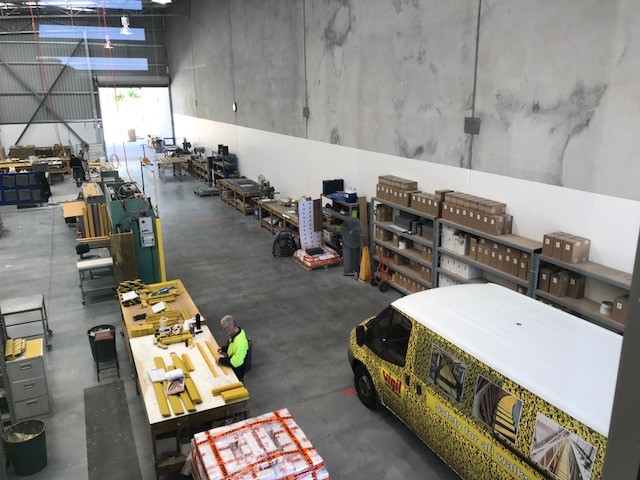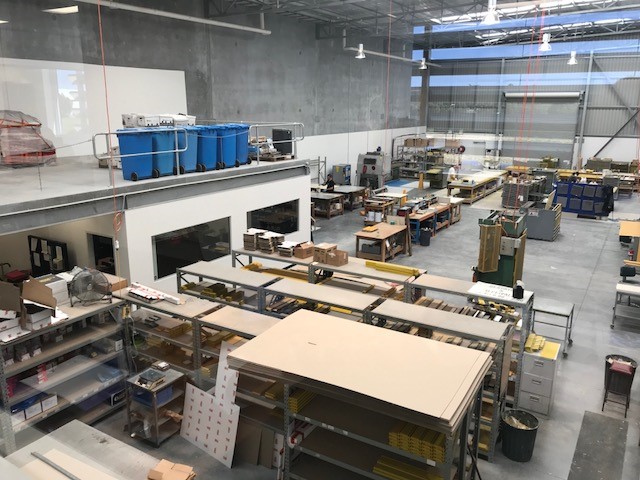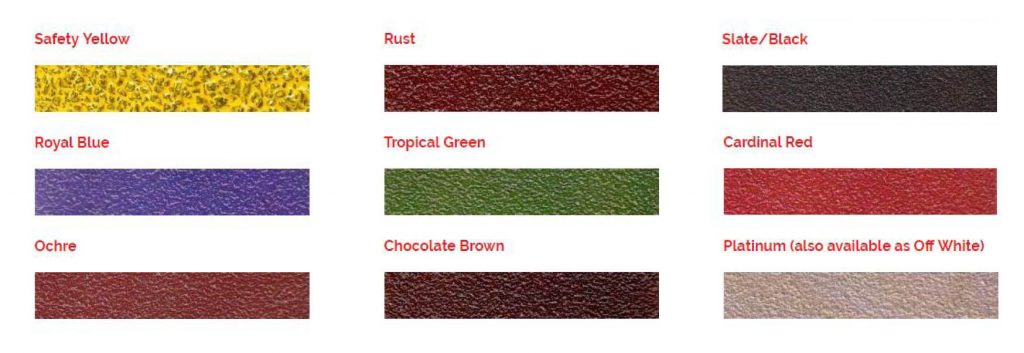 Vigil anti-slip material is suitable for hazardous risk areas and is ideal for preventing accidents due to slippery surfaces on stairs, ladders and pathways.
Vigil anti-slip material is suitable for hazardous risk areas and is ideal for preventing accidents due to slippery surfaces on stairs, ladders and pathways.
It is the most durable and high-quality product of its kind on the market and comes with a 10-year guarantee. The product is easy to clean, is available from stock and can be custom made. This product is especially made for heavy duty wear and the best nonslip solution for slippery surfaces.
The Vigil Antislip metal (Class) 1 product is delivered according the following specifications:
Steel foundation
- For Splash Zones 1.2mm Grade 316 Stainless Steel
- For Acidic areas 1.2mm Grade 316 Stainless Steel
- All other areas 1.2mm AM100 Colorbond Steel
Colorbond steel is used as the standard foundation for all Class 1 & 2 Vigil Antislip products. It is a mild carbon steel which is then dipped in a zinc / alumina solution to a thickness of 150 microns. Both sides of the steel are then primed and the side used as the underside of our products is then powder coated. This makes for a very hard surface and if damaged, a zinc oxide is formed over the damaged area to seal it from the elements and inhibit corrosion. The foundation is therefore “self healing” in the event of damage.
Many of our competitors use normal galvanised sheet. This foundation has short term resistance to corrosion but will rust far sooner than Colorbond steel. A few companies boast that they use stainless steel for their products foundation. The problem is that they don’t use marine grade stainless steel (Grade 316L) but grade 304 which does not really have any advantages over Colorbond steel. The prime disadvantage with stainless steel is that it has a thermal coefficient of expansion approximately fifty percent greater than that of carbon steel or Colorbond steel. This means that it will expand & contract 50% more with temperature change. This is the main cause of delamination, because the resin system does not expand and contract at the same rate as the steel. Although when new a strong bond normally exists, over time this will deteriorate to the point where the entire surface may delaminate in one piece leaving a shiny, and slippery foundation on the steps edges. Of course, there are instances where 316 stainless steel must be used. Only 316 stainless steel will withstand corrosion in splash zones (sea level to + 5 metres) and highly acidic areas. Due to the use of our floating fabric membrane system mentioned below, all Vigil Antislip Class 1 products will withstand delamination for the life of the product even when stainless steel is used as the foundation.
The gauge of steel used is also very important. All Vigil Antislip products have a 1.2mm foundation which is made at the steel mill specifically for our products, in 50 tonne rolls. This gauge is heavy enough to eliminate flexing, another contributor to delamination, without being too thick to create a trip hazard. Because it is not a standard gauge, our competitors don’t have it available to them and the maximum gauge available to them is 0.9mm. This gauge of Colorbond steel or stainless steel is too low for the application and the additional flexing will eventually lead to delamination.
 Fabric Medium Floating on steel foundation and integrated with key coat of resin system
Fabric Medium Floating on steel foundation and integrated with key coat of resin system
This is the main feature which differentiates Vigil Antislip Class 1 products from all of our competitors. Most companies simply sand blast the top of the foundation before applying the aggregate coat of resin. Similar to our Classes 2 & 3, this system appears to work well enough to start with but may delaminate through thermal expansion inequities over time or immediately upon impact. We have developed a system whereby a floating fabric membrane is bonded to the steel foundation prior to the application of the first key coat of resin. This requires a lot more labour to produce a similar looking product to our competitors, however, all of our Class 1 products are guaranteed not to delaminate over time, and the fabric medium holds all layers together after severe impact. In this instance, only the direct impact zone will show damage but more importantly, the damage will never spread from the initial impact point to the rest of the product.
Resin System All layers hand laminated – not sprayed
A number of competitive products we have tested show that most of them do not have long term resistance to solvents which are present in petroleum products. Some are sprayed on which can leave the product uneven and unpredictable. Some are cured in hot ovens, which means that their products cure faster but it also creates a styrene gas within the resin, making them far weaker with a biscuity internal appearance. Styrene gas is also a major contributor to the breakdown of the ozone layer and it is environmentally irresponsible to create. All Vigil Antislip products are individually hand laminated, and cured in a controlled environment. This environment is set at 25 degrees Celsius and zero humidity, the optimum conditions for curing our epoxy resin systems without creating any harmful gases.
Furthermore:
- Cured at optimum temperature and humidity – no oven use
- Resistant to all solvents, petroleum products and acid solutions
- Must not contain any pin-prick holes or bubbles.
Aggregate Silicone Carbide (SiC) Moh’s hardness rating of 9.2 – 9.5
Actual Hardness 2,480Kg / mm2
There are many types of aggregate available for use in antislip materials including silica sand, quartz, aluminium oxide, fused alumina and silicone carbide. Because the aggregate will determine the rate of wear, it is important that the correct aggregate is used. Firstly, it should be a crystalline structure so that it will remain sharp. Secondly, it should be as hard as possible to minimise wear. In virtually all cases, the aggregate used for the construction of Vigil Antislip products is silicone carbide. This aggregate is of a crystalline structure with a hardness of 2,480 Kg / mm2. As a comparison, diamond has a hardness rating of 8,000 Kg / mm2. The only exception is when a customer stipulates our products to be white or photo-luminescent in colour. In these cases the aggregate used is fused alumina, a crystalline product with a hardness of 1,800 Kg / mm2. Because fused alumina is a semi-translucent / white colour, it is ideal for this application but there is a trade-off in hardness. Quartz is often used by our competitors, particularly with F.R.P. products but this only has a hardness of 820 Kg / mm2, less than 1/3 the hardness of silicone carbide. Apart from premature wear, the softer the aggregate, the easier it will pull out of its resin encapsulation. All aggregate is graded prior to being applied to Vigil Antislip products to ensure an even distribution. If a combination of sizes are applied to the resin at once, the smaller grains will remain attached, whereas the larger grains will not bond. It is therefore crucial that this grading is carried out. Products that this is not performed on can be identified by non-uniform areas of coarseness on the one product.
Prior to the application of the final pigmented coat of resin, all of the edges of Class 1 & 2 Vigil Antislip products are chipped so that they are free from aggregate. If this is not performed, it is often chipped off during transportation or installation, which leaves the edge bare and subjected to the elements.
Size of Aggregate Offshore Grade 12/20 mesh matrix
- Industrial Grade 20 Mesh
- Light Industrial Grade 24 Mesh
- Barefoot Grade 100 Mesh
- Commercial Grade 46 Mesh
Warranty: 10 Years on class 1 product.
Attention: Class 2 & 3 specifications are available upon request.
Grade Application
Commercial: Apply in areas where heavy spillage or soilage does not occur.
Industrial: Designed for external areas where there may be spillage and/or soilage from lubricants.
Offshore: Ideal for areas where there is a high buildup of grease or oil. This surface is the most severe and is not affected by very heavy spillage/soilage of chemicals or lubricants.
Colours
In all Industrial or Offshore applications, the Safety Yellow color is recommended. If Commercial grade Stair Nosings are to be utilised internally, consider choosing from the Vigil Antislip colour palette.

Although the initial cost of some competitive products may be less, the long term cost is far more once the replacement costs, removal costs and re-installation costs are taken into consideration. As with any product, an antislip product is only as good as its weakest point. At Vigil Antislip we have refined the product range to a point where there are no weak points so that they will exceed the expectations of all of our valued customers every time, without fail. This being said, we have an active research & development program in place where product improvements are constantly being made.
Please Note : Test Certificates are available upon request.
See our test results, brochure and warranty statement on our download page.



